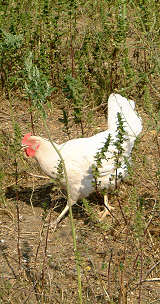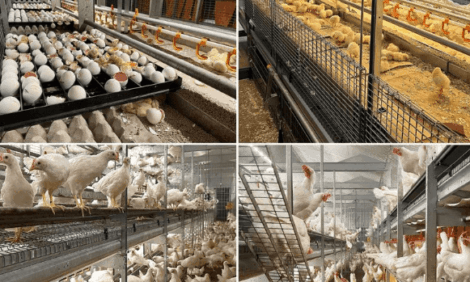



Small Flock Vaccination
By Joseph M. Maudlin, Extension Poultry Scientist, University of Georgia - Vaccines are widely used by the livestock industry to prevent diseases. Commercial poultry (farms with greater than 5,000 birds) are almost universally vaccinated against a variety of diseases. Preventative vaccinations have resulted in increased health and improved production efficiency in the poultry industry.
Deciding Whether Or Not To Vaccinate
Vaccination, however, is seldom practiced by small flock owners. There may be several reasons for this including:
- Rarely have any problems with diseases.
- Unaware that disease may be present.
- Do not get their diseases diagnosed by a knowledgeable professional.
- Do not know where to obtain vaccines.
- Get frustrated because poultry vaccines usually come in 500 to 1,000 dose vials.
Unfortunately, poultry are frequently submitted to veterinary clinics and veterinary diagnostic
laboratories suffering from diseases which could have easily been prevented through appropriate
vaccination. These diseases may result in loss of income from the eggs or meat. Other losses may
include loss of valuable breeding stock, or the inability to participate at bird shows. This can be
especially devastating for youngsters with 4-H projects.
Deciding whether or not to vaccinate against infectious diseases depends on the likelihood that one's
birds may become exposed to illness. If one has a closed flock where new birds are never
introduced, and the birds never leave the farm premise, the likelihood of many diseases is greatly
reduced. Since the risk is small, the owner may opt not to vaccinate.
Vaccination should definitely be considered if the flock owner does one or more of the following:
- Take birds to bird shows.
- Buys birds from hatcheries, bird auctions, and other sources and adds these to an existing flock.
- Has had disease problems in the past.
Planning Your Vaccinations
Unfortunately, it is a fact of life that poultry vaccines are produced in large doses per vial. This is for the convenience of commercial producers who often have several thousand animals to vaccinate. This fact, however, should not discourage the small producer from immunizing his birds. Plan to vaccinate your entire flock at one time. Some vaccines, such as Marek's vaccine, are best performed by the hatchery. Hatcheries and poultry suppliers are usually the best sources for vaccine. Be sure to carefully follow label directions when vaccinating for optimal protection in your birds.
What Vaccines Are Available?
Marek's Disease Vaccine
Marek's disease is a severe, debilitating viral illness of chickens. Birds with this disease frequently
develop paralysis of one or both legs, their wings may droop, and they become very thin. The
internal organs may develop tumors. In an affected flock, only a small percentage show typical
symptoms and die. The majority of the infected birds shed virus for life. These virus-shedding birds
are outwardly normal. When a shedder is introduced to a farm where the disease has never occurred
before, high death losses may be seen. Once a farm has become contaminated with this virus, it is
for all practical purposes, contaminated forever. In general, broiler chickens have less problems from
Marek's disease than birds such as layers, or show birds, which tend to be kept around longer.
The good news is that the vaccines for Marek's disease are highly effective if vaccination is done
correctly. It is best to order chicks already vaccinated at the hatchery. If this cannot be done, be sure
to vaccinate all new birds the first day they arrive on the farm. The vaccine is not very effective if
a bird has already been exposed to the disease for more than a few days.
The vaccine comes frozen in 1,000 dose vials. It is administered under the skin, at the back of the
neck. Package instructions must be followed exactly in order for vaccination to be successful.
Infectious Laryngotracheitis Vaccine
This infectious disease is caused by a virus that affects the bird's trachea (wind pipe). Birds with this
sickness frequently gasp for air and cough up blood. High death loss is possible. The disease is often
passed around at bird shows. It is a disease of chickens.
If an owner chooses to vaccinate, all chickens on the premise must be vaccinated, including any new
birds that are added later. Vaccination is best performed after 4 weeks of age. Yearly boosters are
advised. Rapid diagnosis and vaccination can also stop an outbreak from spreading in an affected
flock.
Fowl Pox Vaccine
Fowl Pox is an infectious viral illness of chickens and turkeys caused by the pox virus. Fowl pox
is strictly a disease of birds and is totally unrelated to the human illness called "chicken pox."
The disease typically causes round, firmly adhering scabs on unfeathered portions of skin, along
with fever and a drop in feed consumption. This results in a slow growth rate and reduced egg
production. On occasion, the disease causes inflammation in the mouth and trachea of birds. These
animals may die from starvation or suffocation. The virus is spread from bird to bird through the
bites of blood-sucking insects or through wounds and scratches by the birds when fighting.
Fowl pox is easily prevented through vaccination. The vaccine is introduced directly into the skin
with a metal two-pronged needle previously dipped in the vaccine. All birds should be vaccinated
on the farm, with yearly booster shots recommended. Early spring or fall are the best times to
vaccinate.
Miscellaneous Respiratory Diseases Including: Newcastle's Disease, Infectious Bronchitis,
Mycoplasmosis, Turkey and Chicken Coryza, and Avian Influenza
Poultry producers are frequently plagued by long-standing "colds" in their flocks. Symptoms in
affected flocks include swelling around the eyes, runny noses, coughing, and poor weight gain.
There are a number of diseases which cause respiratory illness in flocks, including the six diseases
named above. While there are effective vaccines available to prevent these illnesses, it is important
to get an accurate diagnosis first. For example, vaccinating with the Newcastle's disease vaccine
when the flock is actually infected with Bronchitis virus can make the disease symptoms worse!
Your veterinarian can recommend serology (blood testing), bacterial cultures, and virus isolation
to find out what is causing problems on your farm. Many of these tests are available through the
Veterinary Diagnostic Center, located at the East Campus of the University of Nebraska.
Summary
Many effective vaccines are available for the small flock producer. Diseases such as Marek's disease
or Fowl pox need not cause devastating losses in any flock, regardless of its size. For more
information on poultry diseases, or where to obtain vaccines, please call Dr. Eva Wallner-Pendleton
at the Veterinary Diagnostic Center, (402) 472-1434.
Source: University of Georgia - Poultry Science - July 2005









